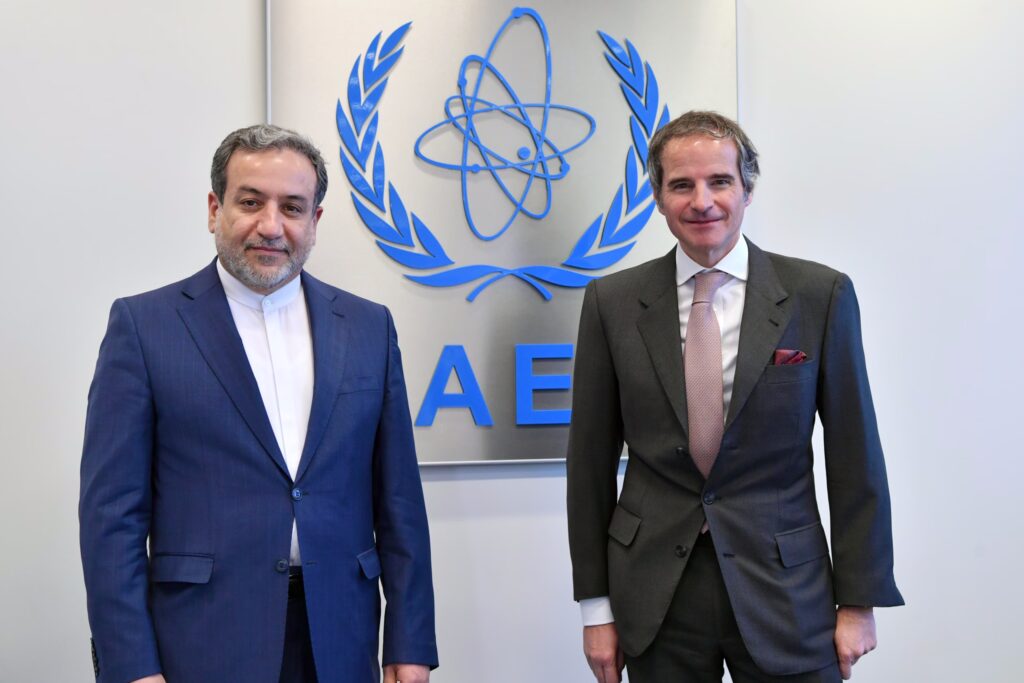War-of-words and Intrigues about Iran’s Nuclear Weapons
Iran will shortly reach nuclear-weapon capacity. And the agreement intended to prevent the country from developing nuclear weapons will expire soon. The U.S. and Israel have declared that they will not allow Iran to obtain nuclear weapons and promise a military response if the recently resumed talks on Iran’s nuclear program drag on.

IAEA Director General Rafael Mariano Grossi (right) met with Iranian Foreign Minister Abbas Araghchi, then Deputy Foreign Minister, at IAEA headquarters in Vienna in April 2021. Photo: Dean Calma/IAEA
A meeting behind closed doors in the UN Security Council discussed Iran’s nuclear program in mid-March. That same day, U.S. President Donald Trump sent a letter to Iran’s Supreme Leader via the United Arab Emirates, stating that he wanted an agreement to stop Iran from acquiring nuclear weapons to prevent possible military action from the U.S. and Israel. A few days later in Beijing, China hosted secret talks with Iran and Russia on Iran’s nuclear weapons.
Iran is ready to begin indirect talks with the U.S. about its nuclear program “with the aim of reaching an agreement,” wrote Iranian Foreign Minister Abbas Araghchi in the Washington Post in early April. But Trump must first agree that there can be no “military option,” Araghchi emphasized, adding that Iran “would never accept coercion.”
That the negotiations in Oman on April 12 were to be indirect contradicted Trump’s claims shortly afterward when he asserted they would be “direct talks.”
The U.S. withdrew from the 2015 nuclear agreement during Trump’s first term. The nuclear deal with Iran signed by several major powers in 2015 allowed Iran to finance a military build-up and continue supporting its terror proxies Hezbollah and Hamas, the U.S. stated when it exited the agreement in 2018.
Violation of Restrictions
At a White House press conference with Trump and Israeli PM Benjamin Netanyahu, the message was clear: they had agreed that “Iran will not have nuclear weapons” and that “the military option” would be implemented if the talks were delayed.
Iran has increasingly violated the restrictions imposed under the existing nuclear deal and has stockpiled enough highly enriched uranium to produce several bombs, according to the BBC.
The U.S. Department of the Treasury issued new sanctions against Iran’s nuclear program just days before American and Iranian officials held their talks in Oman on April 12.
“The Iranian regime’s reckless pursuit of nuclear weapons remains a serious threat to the United States and a threat to regional stability and global security,” said U.S. Treasury Secretary Scott Bessent in a statement.
Ahead of the meeting, Trump warned that it would “be a very bad day for Iran” if the talks failed.
“I think everyone agrees that making a deal would be preferable to doing the obvious,” he said.
Six Nuclear Warheads
The U.S. has reimposed sanctions on Iran since Trump began his second term. The UN’s International Atomic Energy Agency (IAEA) warned in February that Iran had stockpiled enriched uranium theoretically soon sufficient for six nuclear bombs.
Khamenei’s advisers recently warned that “continued external threats” could lead to the expulsion of UN inspectors and the transfer of enriched material to secret locations. Iran may suspend cooperation with the UN’s nuclear oversight if external threats persist, said an adviser to Iran’s Supreme Leader after the U.S. president once again warned of military action if Tehran does not agree to a nuclear deal.


